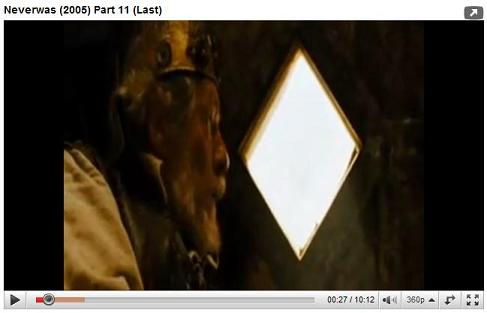See also Ian McKellen in Neverwas and Gods and Monsters .
Tuesday, June 17, 2014
Sunday, June 15, 2014
Thursday, May 6, 2010
Infinite Jest
Leg-Pulling
 |
"… to make the author manifestly unreliable"
Not to mention the reader.
Related material —
Monday, February 22, 2010
Annals of Philosophy
The Medium is the Message
From the Wikipedia article
on Marshall McLuhan–
(Click images for some background.)
Related material:
a web page on McLuhan's
student Walter J. Ong, S. J.,
Sunday, February 21, 2010
Reflections, continued
"The eye you see him with is the same
eye with which he sees you."
– Father Egan on page 333
of Robert Stone's A Flag for Sunrise
(Knopf hardcover, 1981)
Part I– Bounded in a Nutshell

Ian McKellen at a mental hospital's diamond-shaped window in "Neverwas"
Part II– The Royal Castle

Ian McKellen at his royal castle's diamond-shaped window in "Neverwas"
Part III– King of Infinite Space

H.S.M. Coxeter crowns himself "King of Infinite Space"
Related material:
See Coxeter in this journal.
Wednesday, February 10, 2010
Mathematics and Religion, continued
But Seriously…
From "Georg Cantor and the Battle for Transfinite Set Theory," by Joseph W. Dauben (pdf)–

"It is easy, of course, to misinterpret the religious element in Cantor's thinking, as popularizers often do. This was certainly the case in an article that appeared not long ago in the French magazine La Recherche, which supplied [the above] caricatures to illustrate an expository article about Cantor, his religious convictions, psychological illness and transfinite set theory.* The first drawing depicts Cantor in ecstasy, as it were, receiving the divine message. In the second illustration, the figure with the gun of course is meant to be Kronecker– with God helping Cantor to maintain his balance– all of which rests precariously on a transfinite aleph. But there is a very serious side to all of this…."
* Pierre Thuillier, “Dieu, Cantor et l'Infini,” La Recherche, (December, 1977), pp. 1110-1116.
Everything and More: A Compact History of Infinity, by David Foster Wallace–
"In modern medical terms, it's fairly clear that G.F.L.P. Cantor suffered from manic-depressive illness at a time when nobody knew what this was, and that his polar cycles were aggravated by professional stresses and disappointments, of which Cantor had more than his share. Of course, this makes for less interesting flap copy than Genius Driven Mad by Attempts to Grapple with ∞. The truth, though, is that Cantor's work and its context are so totally interesting and beautiful that there's no need for breathless Prometheusizing of the poor guy's life. The real irony is that the view of ∞ as some forbidden zone or road to insanity– which view was very old and powerful and haunted math for 2000+ years– is precisely what Cantor's own work overturned. Saying that ∞ drove Cantor mad is sort of like mourning St. George's loss to the dragon: it's not only wrong but insulting."
Related entertainment:
David Foster Wallace,
Influential Writer, Dies at 46
and the film "Neverwas"–







